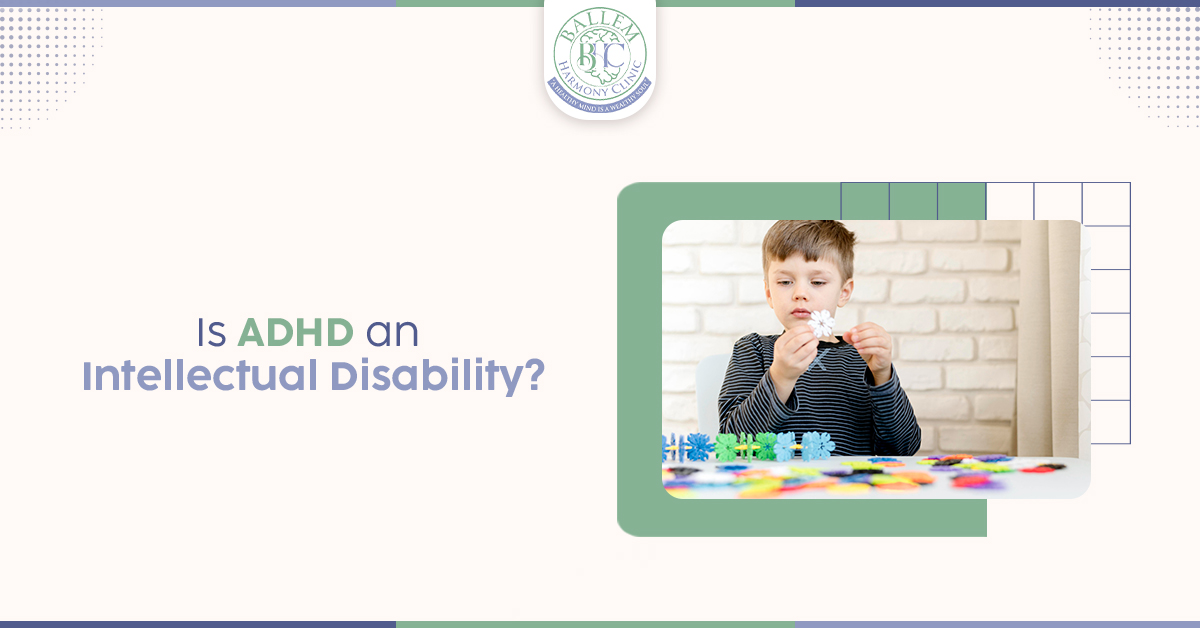It is a very common condition, ADHD (Attention-Deficit Hyperactivity Disorder). It impacts concentration, interferes with the management of organizations, and challenges regulation. This unsettled problem may affect everyday life at any age.
ADHD becomes a roller coaster experience, but it is not an intellectual disability. Individuals experiencing ADHD could be learners with problems or even developmental delays. They are capable of influencing the way they learn and react to treatment.
Being informed about the difference will allow people to get the right support. This may involve academic help, treatment, and drugs.
ADHD and IDEA: Educational Implications
The IDEA calls ADHD “Other Health Impairment” in the U.S. This lets students with ADHD get IEPs or 504 Plans, even without an intellectual disability and ADHD.
ADHD does have provisions in IDEA. It does affect learning, behavior, and attention spans, but having ADHD does not imply that a person lacks any intelligence.
ADHD vs. Intellectual Disability: What’s the Difference?
An intellectual disability (ID) is defined by:
- An IQ score below 70
- Difficulty with adaptive behaviors (daily living skills, communication, and social functioning)
- Onset during developmental years
In contrast, ADHD is characterized by:
- Inattention
- Hyperactivity
- Impulsivity
- Executive functioning challenges
A person with ADHD might struggle in school or in relationships. However, these challenges come from neurological dysregulation, not low IQ. It’s a developmental disability, not an intellectual one.
The Stigma: Language Matters
Many people with ADHD get mislabeled or even self-label with harmful terms like:
- “Why am I so retarded?”
- “Are ADHD people retarded?”
- “How do you know if youre dumb?”
Such questions are usually asked after many years of school or workplace misery. These sufferings are normally as a result of lack of support. ADHD does not have anything to do with retardation. The terminology propagates stigma and misinformation through its use. Today, we use the term intellectual disability instead of mental retardation in clinical practice. This revision shows they want to use language that respects individual dignity.
Borderline Intellectual Functioning and ADHD
Borderline intellectual functioning refers to people with an IQ between 70 and 85. This range isn’t viewed as an intellectual disability. However, it can make academic or cognitive tasks more challenging.
When ADHD and borderline intellectual functioning coexist, the individual may:
- Struggle more in school than peers
- Require additional support or accommodations
- Face difficulty with impulse control and memory
Borderline intellectual functioning treatment may involve tutoring, behavior therapy, and special education support tailored to the individual’s cognitive profile.
Is ADHD a Developmental Disability?
Yes, ADHD is a developmental disability. It starts in early years and continues in many settings, like school, work, or home. But no, it is not an intellectual disability.
People usually ask, “Is ADHD a form of mental retardation?”, or “Are people that take ADHD retarded?” In fact, they are using a category of disability confused with another one. Those words are inaccurate, as well as utterly disrespectful in time.
Recognizing Signs of Intellectual Disability
While ADHD may share some behavioral characteristics with intellectual disability, they are distinctly different. Here are some low IQ symptoms of intellectual disability:
- Difficulty learning basic academic concepts
- Trouble communicating or understanding others (intellectual disability can’t talk is a concern in severe cases)
- Requiring support for daily tasks
- Low IQ behavior in adults such as poor judgment or limited reasoning
There are four levels of intellectual disability:
- Mild – May learn basic skills and live independently with some support
- Moderate – Requires supervised care and structured environments
- Severe – Needs extensive support and may have very limited communication
- Profound – Requires constant care; very limited cognitive functioning
Raising a child with mild intellectual disability can be tough. It brings emotional and practical challenges. However, early therapy and educational support can help kids reach their potential.
Therapies for ADHD and Intellectual Disabilities
Although ADHD and intellectual disability are different, some therapies may overlap, such as:
For ADHD:
- Cognitive Behavioral Therapy (CBT)
- Medication (stimulants and non-stimulants)
- Executive functioning coaching
- Behavioral interventions at home and school
For Intellectual Disability:
- Speech-language therapy
- Occupational therapy
- Behavior therapy
- Special education programs
- Life skills training
Families gain from integrated care that meets both emotional and functional needs.
Conclusion: Is ADHD an Intellectual Disability?
ADHD is not an intellectual disability, is it? It is not, it is a neurodevelopmental disorder. It affects cognition, scholastic performance, and social performance. Sometimes, ADHD occurs alongside borderline intellectual functioning or an intellectual disability. The fact that one has ADHD does not imply he or she is stupid. Besides, the term retarded has become obsolete.
If you or a loved one has ADHD, learning issues, or might have an intellectual disability, you’re not alone. Help is available.
Ballem Harmony Clinic offers specialized care for individuals with ADHD, learning differences, and developmental delays. Our team uses proven therapies and support services. We help kids and adults reach their full potential.
Frequently Asked Questions (FAQs)
Is ADHD an intellectual disability?
No. In fact, ADHD is a disorder in the neurological development and that doesn’t qualify it to be termed as an intellectual disability. Now, individuals who have ADHD perform just like an average person in terms of intelligence or even above average.
Can ADHD be confused with low intelligence?
Yes. Apparent learning problems or their distractedness might mislead someone into believing they’re slow. In fact, it comes from a difficulty in paying attention and not self-control, and not from low overall intelligence.
What is the difference between ADHD and mental retardation?
“Mental retardation” is now called “intellectual disability.” ADHD is different. It does not cause the same overall cognitive impairment as an intellectual disability.
Is ADHD a form of developmental disability?
Yes. ADHD is a developmental disability. It makes it hard for the brain to function well in daily life.
Can a person have both ADHD and an intellectual disability?
Yes. The two can exist together. They may need different support, like therapy, specialized education, and controlled settings.








No comment